Lubrication-free and resistant to dirt from the road
Utility vehicle technology: linear plain bearings for steering systems on bus trailers
The topic of bus trailers is gaining in economic and ecological importance. This is because the ability to detach them from the towing vehicle during off-peak periods makes it possible to reduce wear and fuel consumption – key benefits in these times of increasing energy prices and particulate pollution regulations. The people carrying trailers have to meet extremely high safety standards. Robust linear guides with polymer gliding elements for the steering system help keep the trailer safely on track at all times – without grease or oil and with high levels of dirt.
“Our strengths lie in the provision of intelligent vehicle solutions,” reports Till Baumann, in house designer at Göppel Bus GmbH in Augsburg. “We are specialists in customized bus designs and develop new vehicle concepts. Providing it is technically feasible, we fulfill all our customers’ requests.” These include ‘maxi’ and ‘miditrains’ – people-carrying trailers for buses that are generally used by local public transport companies to deal with the high fluctuations in passenger numbers. However, smaller bus companies for whom the use of articulated buses would not be financially viable are also opting for the towing vehicle plus trailer solution.
“With variable lengths, when coupled to a MAN standard bus, our trailer makes it possible to flexibly respond to the actual number of passengers,” states Till Baumann in summary of the key benefit. “Within the scope of implementing competition-oriented EU regulations and the energy law reform, as well as in view of increasing cost pressures, all transport companies have to review their cost-effectiveness and efficiency in all areas – and align their investment decisions with these general conditions.” “
At present, exception permits must still be obtained for bus trailers to be approved. “There are however signs that these criteria will be relaxed in future,” states the designer with a sense of certainty. The company first launched its bus trailers over four years ago. “On approval grounds, the trailer uses a purely mechanical steering system, for which we sought durable, high-quality bearings that could withstand the strains of everyday use.” “
Right from the outset, open and closed ‘drylin® R’ linear plain bearings from igus® GmbH, Cologne, have been used in the bus trailers. The product range is based on highly wear resistant polymers, specially developed for linear technology. The dimensions are compatible with standard ball bearings. Their special geometry guarantees robustness even under extreme conditions.
Göppel Bus GmbH is a flexible partner for the utility vehicle industry. “For the company MAN, for example, we produce all customer-specific solutions that are shorter than 12 m and narrower than 2.50 m,” comments Till Baumann. “We also have our own products on the market, such as the two bus trailers and a Sprinter minibus.” “
In 1923, the vehicle builder Markus Göppel founded an automobile body shop in Augsburg, which brought its first bus bodies to market as little as two years later. By 1935, the first automobile body completely made of steel was manufactured on MAN carriages. In the late 1950s, MAN got the company more and more involved in the manufacturing of articulated buses. The production activities at the time were centered on building trailers. From the early 1980s, the plant was not only involved in large-series production but also manufactured numerous custom-built designs as well as prototypes especially for MAN.
The bus specialist is continuing to expand and now has two offices. Whereas the design department and the order center are based in Augsburg, production occurs at the Ehrenhain site, where the MAN service center is also located. In total, the company employs approximately 230 people.
Safety and comfort, simple handling and trouble-free maintenance: these were the key factors when developing the trailer, which has four-wheel steering. The redundant sliding rod system developed and patented by the company plays a key role in the solution as a whole. It transmits the steering movements from the front to the rear axle in a purely mechanical fashion and comprises several rods plus two rotary rim discs on the ends. This makes it possible to produce different rear axle steering angles depending on the usage profile and the customer desires.
“We looked for suitable bearings for the self-centering sliding rod steering system. Not only did these have to have an appropriate material quality and not rust, they also had to be lubrication and maintenance free,” reflects Till Baumann. “All bearings are permanently subjected to dirt from the road. They also have to withstand major temperature differences in summer and winter. The entire steering system is deliberately exposed so that any defects can be immediately identified.”
‘drylin® R’ linear guides are almost entirely dirt resistant and offer excellent reliability even when subjected to the heaviest of dirt. The lack of need for lubricant as well as the special design of the bearing surface with individual glide pads and the connecting elements in between are particularly advantageous. Even when the shaft is subjected to wet dirt, it is wiped away by the individual glide pads and pushed back into the contact-less area. The crossbars of the bearing’s running surfaces then glide along the fully wiped-clean track.
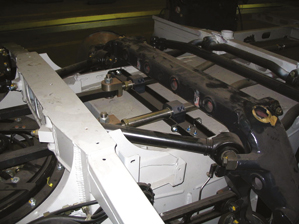
Self-centering, duo-driving-rod steering system with maintenance-free linear plain bearings from igus®.
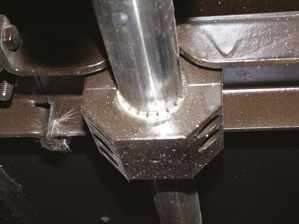
The steering system is exposed. The lubrication-free linear plain bearings must withstand heat, snow, salt, grit and moisture.
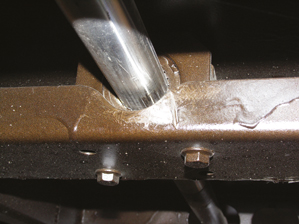
Robust ‘drylin® R’ linear guides for bus trailers.
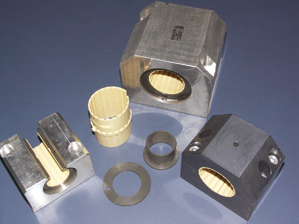
Split ‘drylin® R’ linear plain bearings with misalignment compensation.
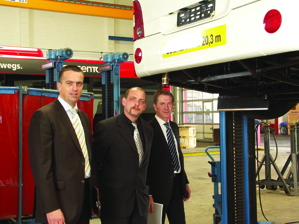
From left: igus® Head of Sales Tobias Vogel, designer Till Baumann (Göppel Bus) and Manfred Sirch (igus®)
“The main advantage of this bearing is that it does not require lubrication,” states Till Baumann. “This is of crucial importance to this usage. ” In total, 14 ‘drylin® R’ linear plain bearings are built into the steering system of each trailer. They transmit the steering movement from the front to the rear wheels. “We specially selected guide systems that can easily absorb misalignments through a spherical area in the center of the housing in order to protect the push rod against edge loads.”
In addition to their design benefits, the linear plain bearings also impress with their material properties. They are non-corrosive, wear-resistant, insensitive to dust and dirt, have low coefficients of friction, are quiet running and have a low weight. “What is more,” states designer Till Baumann, “they do not blow our budget. Developing our own product would certainly not have been financially viable. "A short time ago, the first approved trailer came to Augsburg for a general overhaul. “We paid particular attention to analyzing the bearing points,” reports Baumann. “We found no visible deficiencies. The bearing points had not even been attacked by flash rust.” “
Based on the specified financial framework, during the design phase the company quickly decided to look for a suitable specialist supplier for the bearing technology. Thanks to the broad range of information and tools on the igus® website (www.igus.de), the search did not take long. “We were instantly impressed. The calculation examples are extremely good. You immediately receive information about which technical options are available,” states Baumann. “And what is particularly interesting for the designers is that 3D CAD data can be easily provided for download. The information was so comprehensive that we were able to begin our calculation straight away. ” The missing data, such as the wear calculation, was then added on site. Sophisticated intricacies such as the compensation of misalignments were also clarified in a consultancy meeting with igus®.
“We now build 15 to 25 bus trailers per year,” states Till Baumann. Multiple bus trailers are already being used successfully, principally in Baden-Württemberg. They have proven themselves on narrow, undulating roads and rarely get stuck in snow and ice in the winter thanks to the drive on the second axle. However, we are now looking to the future: today, modular bus concepts are required that can flexibly respond to the highly fluctuating passenger volumes. This ensures that vehicles can be economically used at both peak and off-peak times.
Using the trailers is both environmentally and budget friendly. Calculations show that their use for an entire fleet can reduce annual fuel costs by more than 30%. This leads to six figure savings. “A highly convincing argument,” states Till Baumann with conviction. But the calculations go even further. As the linear plain bearings are lubrication free, there is absolutely no need for expensive central lubrication, which also causes a great deal of pollution. “In opting for maintenance and lubrication-free linear plain bearings, we have certainly backed the right horse” states Till Baumann in summary of his experience.
More information
More than 100,000 products available! Delivery and consultation Mon-Fri from 7am-8pm and Sat from 8am-12pm!